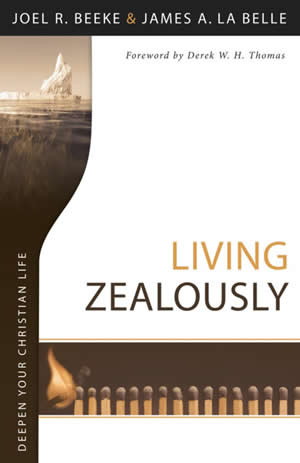
Living Zealously
Description : In a day when immediacy and ease are such commonplace elements of everyday life the long work of deep contemplation often becomes a difficult and much neglected task. While many contemporary voices address the need for deeper introspection, one might ask if the Puritans have anything to share with the modern reader as it relates to a deep examination of internal motivations for and towards God. Living Zealously attempts to answer that very question.
Living Zealously strives to help the reader “understand what Christian zeal is, and encourage [the reader] to be consumed with it for the glory of God, His church, and His word” (page 5). This is the second title—the first, Living by God’s Promises, wasalso co-authored by the same men—in the Deepen Your Christian Life series which focuses on gathering various Puritan writings on somewhat overlooked subjects and combining them in more contemporary language for today’s readers.
Dr. Joel Beeke holds a Ph.D. in Reformation and Post-Reformation Theology and serves as the President of Puritan Reformed Theological Seminary and also pastors the Heritage Netherlands Reformed Congregation located in Grand Rapids, Michigan. Rev. James La Belle holds an M.Div. and currently serves as the Pastor of Presbyterian Church of Cape Cod in Massachusetts. With both authors drawing on their formal theological training and the practical experience of pastoring, the tone of the book carries a very pastoral feel that is relevant to anyone church member. Yet, as good pastors are wont to do, they urge the reader towards a deeper understanding through one’s own personal application of Scripture.
This is accomplished in 133 pages as the book consists of only six short chapters, roughly twenty pages apiece; each with a focused topic relating to zeal: 1) The Nature and Marks…, 2) The Necessity and Motives…, 3) The Regula¬tion…, 4) The Objects…, 5) The Outworking…, and 6) The Means of Christian Zeal. Each chapter has a similar feel as the authors highlight Puritan writings related to the particular emphasis of the chapter and then compare that with Scripture to show that while the topic of zeal is not often the main point of God’s Word it is a common thread that runs through its foundation.
With a quick glance at the chapter titles one might be most curious as to what the “Regulation of Christian Zeal” and the “Objects of Christian Zeal” might pertain to. While every chapter lends itself to a deeper understand of Scripture regarding the application of zeal, these two seem to initially place an unusual emphasis on works since most religious groups place a greater importance on “regulating” the “objects” of their service as the key indicator of one’s devotion and ultimately their salvation. Yet it is in these two chapters that the Puritan’s love for God as well as their thorough knowledge of Scripture comes shining through.
Proper understanding of the need for the regulation of Christian zeal is captured in a quotation by John Evans (1680–1730). “It is fit to be observed, that we read in scripture of a bad zeal more frequently . . . than of a good one. . . . [This] should make us sensible, how highly necessary it is, that a strict caution and a very careful regulation should attend our zeal” (52). This then is paired with the accounts of David’s census (2 Sam 24:3–4) and Hezekiah’s display of the temple treasures (2 Kings 20:12–15) where good intentions were in reality examples of poorly regulated zeal demonstrating the need for it to be planned properly.
The book does an excellent job of drawing out the heart of the matter of being a zealous Christian as it moves from regulation of zeal to the objects of zeal. This chapter in particular drives home Maranatha’s mission (Eph 1:12) “to be to the praise of his glory” as a quotation by Samuel Ward (1577–1640) states that Christian zeal “is a spiritual heat wrought in the heart of man by the Holy Ghost, improving the good affections of love, joy, hope . . . for the best service and furtherance of God’s glory, [together] with . . . his word, his house, his saints, and salvation of souls” (76). The authors very clearly articulate that “zeal has no more ultimate intent than to bring glory to God” (74) which makes God our primary object of zeal in our Christian living. Because the topic is about the nature of our interaction with God, the book is packed with challenges for personal growth in sanctification on nearly every page.
One relatively minor critique with the book is the order of the chapters. The topic of the object of zeal covered in chapter four really is the impetus for having any zeal at all, and it could logically be seen to be placed as the first chapter since it serves as the foundation for the rest of the book. In spite of this, the chapters naturally flow from the broader philosophical definitions into the Biblical foundation and then conclude with the practical outworking.
For further reflection and study every chapter concludes with ten study questions which would fit well whether used as a personal workbook, a Sunday School class, or small group discussion. Preceding the first chapter is a short biographical section containing information about the puritan authors whose writings are examined in the book. Additionally, a short bibliography contains suggestions for continued reading from both Puritan and contemporary authors on the topic of zeal.
Beeke and La Belle aptly glean from the diligent and disciplined effort put forth by the Puritans, clearly demonstrating that their writings are still relevant in helping comprehend Scripture as it relates to living as a zealous Christian today.


